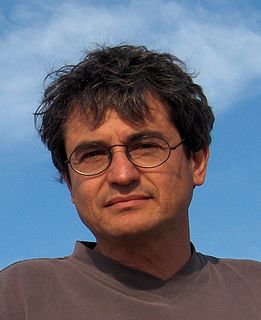A Quote by Mary Oliver
Related Quotes
I keep feeling that there isn't one poem being written by any one of us - or a book or anything like that. The whole life of us writers, the whole product I guess I mean, is the one long poem - a community effort if you will. It's all the same poem. It doesn't belong to any one writer - it's God's poem perhaps. Or God's people's poem.
Rationality and the instinct of collaboration have already given us large regions and long periods of peace and prosperity. Ultimately, they will lead us to a planet without countries, without wars, without patriotism, without religions, without poverty, where we will be able to share the world. Actually, maybe I am not sure I truly believe that I believe this, but I do want to believe that I believe this.
The poem is not, as someone put it, deflective of entry. But the real question is, 'What happens to the reader once he or she gets inside the poem?' That's the real question for me, is getting the reader into the poem and then taking the reader somewhere, because I think of poetry as a kind of form of travel writing.
Instead of loving a God, we love each other. Instead of the religion of the sky-the religion of this world-the religion of the family-the love of husband for wife, of wife for husband-the love of all for children. So that now the real religion is: Let us live for each other; let us live for this world without regard for the past and without fear for the future. Let us use our faculties and our powers for the benefit of ourselves and others, knowing that if there be another world, the same philosophy that gives us joy here will make us happy there.
Poetry is a river; many voices travel in it; poem after poem moves along in the exciting crests and falls of the river waves. None is timeless; each arrives in an historical context; almost everything, in the end, passes. But the desire to make a poem, and the world's willingness to receive it--indeed the world's need of it--these never pass.
The subject of the poem usually dictates the rhythm or the rhyme and its form. Sometimes, when you finish the poem and you think the poem is finished, the poem says, "You're not finished with me yet," and you have to go back and revise, and you may have another poem altogether. It has its own life to live.
How could I have thought that I needed to cure myself in order to fit into the 'real' world? I didn't need curing, and the world didn't, either; the only thing that did need curing was my understanding of my place in it. Without that understanding - without a sense of belonging to the real world - it was impossible to thrive in an imagined one.




































